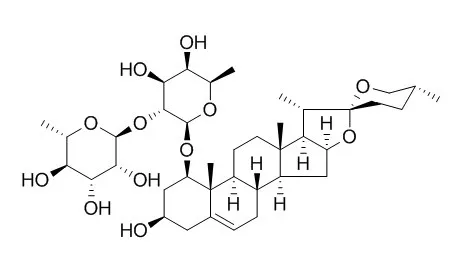| Description: |
Ophiopogonin B is often used in Chinese traditional medicine to treat pulmonary disease, it is a prospective inhibitor of PI3K/Akt and may be used as an alternative compound to treat NSCLC. It may be considered a potential inhibitor of gastric cancer progression, and may be used as an alternative compound for its treatment. Ophiopogonin B induces apoptosis, mitotic catastrophe and autophagy , has inhibitory effect on adhesion, invasion and migration of A549 cells in vitro. |
| In vitro: |
| Oncol Rep. 2013 Feb;29(2):430-6. | | Ophiopogonin B-induced autophagy in non-small cell lung cancer cells via inhibition of the PI3K/Akt signaling pathway.[Pubmed: 23151908] | Ophiopogonin B (OP-B) is a bioactive component of Radix Ophiopogon Japonicus, which is often used in Chinese traditional medicine to treat pulmonary disease. However, whether or not Ophiopogonin B has any potential antitumor activity has not been reported.
METHODS AND RESULTS:
Here, we show that the non-small cell lung cancer (NSCLC) cell lines NCI-H157 and NCI-H460 treated with Ophiopogonin B grow more slowly and accumulate vacuoles in their cytoplasm compared to untreated control cells. Flow cytometric analysis showed that the cells were arrested in G0/G1 phase. Nuclear morphology, Annexin-V/PI staining, and expression of cleaved caspase-3 all confirm that Ophiopogonin B does not induce apoptosis. Instead, based on results from both transmission electron microscopy (TEM) and the expression of microtubule-associated protein 1 light chain 3-II (LC3-II), we determined that Ophiopogonin B treatment induced autophagy in both cell lines. Next, we examined the PI3K/Akt/mTOR signaling pathway and found that Ophiopogonin B inhibited phosphorylation of Akt (Ser473, Thr308) in NCI-H157 cells and also inhibited several key components of the pathway in NCI-H460 cells, such as p-Akt(Ser473, Thr308), p-p70S6K (Thr389). Additionally, insulin-mediated activation of the PI3K/Akt/mTOR pathway provides evidence that activation of this pathway may correlate with induction of autophagy in H460 cells.
CONCLUSIONS:
Therefore, Ophiopogonin B is a prospective inhibitor of PI3K/Akt and may be used as an alternative compound to treat NSCLC. | | Mol Med Rep. 2016 Jun;13(6):4981-6. | | Effects of ophiopogonin B on the proliferation and apoptosis of SGC‑7901 human gastric cancer cells.[Pubmed: 27121658 ] | Ophiopogonin B (OP‑B) is a bioactive component of Radix Ophiopogon japonicus, which is often used in traditional Chinese medicine to treat cancer.
METHODS AND RESULTS:
The present study aimed to investigate the antitumor activity of OP‑B in gastric cancer. Cell Counting kit‑8, flow cytometry with Annexin V‑fluorescein isothiocyanate, Hoechst staining, mitochondrial membrane potential (MMP) detection, and reactive oxygen species (ROS) assay were used to detect the biological function of SGC‑7901 gastric cancer cells. The results demonstrated that high concentrations of OP‑B (5, 10 and 20 μmol/l) exerted potent antiproliferative effects on SGC‑7901 cells in a dose‑dependent manner. Furthermore, apoptotic rates were increased and cell morphology was altered following treatment with OP‑B. In addition, OP‑B‑induced apoptosis of SGC‑7901 cells was associated with loss of MMP and increased ROS generation. Western blotting indicated that treatment with OP‑B increased the protein expression levels of caspase‑3 and B‑cell lymphoma 2 (Bcl‑2)‑associated X protein, whereas the expression levels of Bcl‑2 and the phosphorylation levels of extracellular signal‑regulated kinases 1/2 and c‑Jun N‑terminal kinases 1/2 were decreased.
CONCLUSIONS:
These results suggest that OP‑B may be considered a potential inhibitor of gastric cancer progression, and may be used as an alternative compound for its treatment. |
|






 Cell. 2018 Jan 11;172(1-2):249-261.e12. doi: 10.1016/j.cell.2017.12.019.IF=36.216(2019)
Cell. 2018 Jan 11;172(1-2):249-261.e12. doi: 10.1016/j.cell.2017.12.019.IF=36.216(2019) Cell Metab. 2020 Mar 3;31(3):534-548.e5. doi: 10.1016/j.cmet.2020.01.002.IF=22.415(2019)
Cell Metab. 2020 Mar 3;31(3):534-548.e5. doi: 10.1016/j.cmet.2020.01.002.IF=22.415(2019) Mol Cell. 2017 Nov 16;68(4):673-685.e6. doi: 10.1016/j.molcel.2017.10.022.IF=14.548(2019)
Mol Cell. 2017 Nov 16;68(4):673-685.e6. doi: 10.1016/j.molcel.2017.10.022.IF=14.548(2019)